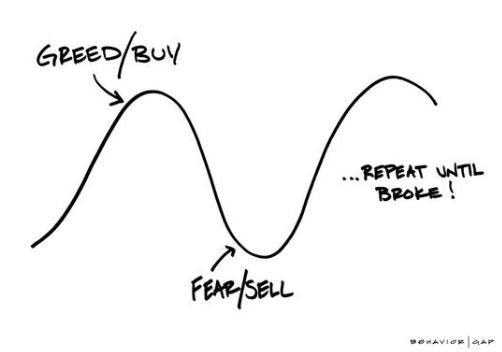What To Do In Rocky Markets
Debbie Bongard - Dec 07, 2018
2018 has been filled with an increase in volatility across all financial market and this article looks more into what you should do when volatility spike.

What to do in Rocky Markets
2018 has been filled with an increase in volatility across all financial markets between the protectionist rhetoric of the Trump Administration on trade policy, interest rate increases affect stock valuations, and increasing share price fluctuations due to momentum-based strategies and algorithmic trading. While it is natural to panic during a market correction, there are a few things that you should do to help you navigate the turbulence.
An analogy we often use with our clients is that the financial markets are like the ocean and you are a little boat trying to make it from point A (where you are now) to point B (your investment goal). While you can set your course and make best-laid plans, the ocean does not care about you or your goals, and sometimes you have to ride out a storm and recalibrate if you are blown slightly off path.
Don’t Jump Ship!
The worst thing you can do when investing is let your emotions take control of your rationale investment decision making. Often time when a crisis reaches its pinnacle and contagion sets in, many investors run to the sideline selling their investments content to sit in cash and try and get back into the market when the storm has passed.
This is most often the WORST thing that you can do!
Trying to time the market in a period of market volatility most often leads to you being in a worse financial situation than if you had remained in the market throughout the volatility. On facile we have as human is that we will let our biases affect us negatively when we are investing. We believe that when the markets are peaking that this period of exuberance will continue forever and that when markets are crashing that the crashing will continue indefinitely. Also, financial markets tend to “buy the rumour and sell the news,” believing that the outcome of an event will be more substantial than it is. This leads to the markets being overbought and oversold and can lead to quick swings in the market. By exiting the markets and trying to time your re-entry at the perfect moment often result in you missing the first part of a snapback rally and leave you worse off than if you had ridden out the volatility.
It is important not to let emotion dictate your decisions. One of the benefits of working with an advisor is that we become a buffer between you and making a bad financial decision with your investments. (The last few periods of financial volatility there have been stories of even discount brokerages blocking their clients from signing into their portfolios from making emotional decisions.)
Company Specific or Overall Market?
The first question to ask yourself when looking at an investment that has fallen is, “Whether or not the change in value has been due to a change at the corporation or if it has traded off due to the overall market?”
If the change has been company specific, you need to ask yourself is “Does this investment still fit your investment thesis of why you originally purchased it?” If the investment does meet your rationale for purchasing it, it may be a good time to sell the investment on any market strength and find another which meets your investment criteria. This is a process that we follow all of the time with our team to determine the stocks we have in our client’s portfolios, where we are continually evaluating our thesis for purchasing a company and evaluating that company versus alternative opportunities in case it no longer fits our rationale.
If the change is market-related and there has been no change in the fundamentals of the company you are invested in, it is often best suited to ride out the market volatility.
This same process can also be done on a sector and geographic basis as well as on different asset classes. It is essential to have a rationale for each investment decision you would make. (You make a justification for all other large investments and purchases in your life, so why not your financial investments)
Do your investments match your risk profile and goals?
The main reason investors panic in a period of market volatility is that their investments do not match their risk profile. If you are panicking during a correction, you should be asking yourself whether your portfolio matches your risk profile. It is never too late to reassess for asset allocation so that you can stay in the market for the long-term, to ensure your portfolio is aligned with your goals, time horizon and risk profile, to get out of some invests that you have no place owning in the first place, and to take stock of your financial life to make sure you can survive a downturn in the markets or economy.
Moving Forward…
Now that you have triaged the current market crisis, it is important to be introspective and look at how you have reacted with the current market volatility. It may be essential to readjust your strategy to allow you to stay invested in the markets for the long term.